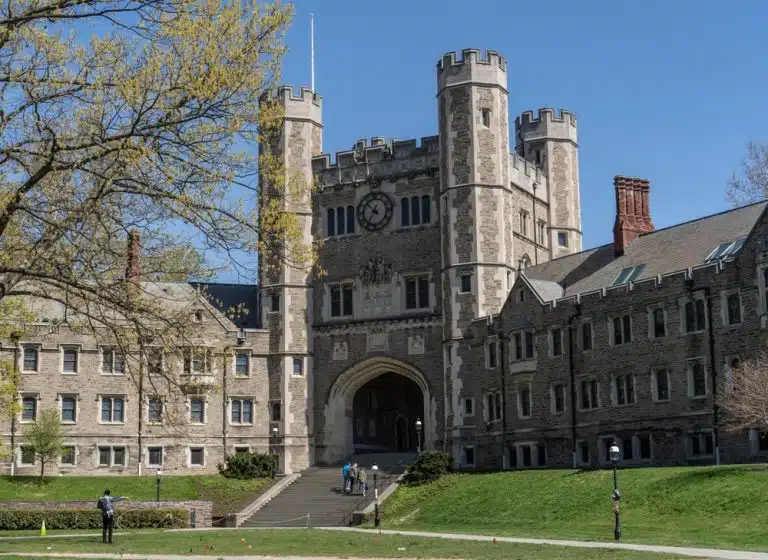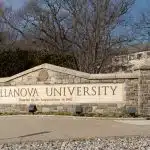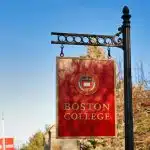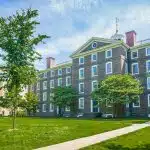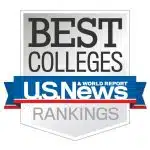According to the U.S. News & World Report, Princeton University consistently ranks as one of the top universities in the world, often securing the #1 spot in national rankings. However, beyond its academic reputation, many fun facts about Princeton University make it stand out. This blog will explore some fun facts about Princeton University that you might not know.
- Princeton University Fun Facts
- What Majors Does Princeton Offer?
- Princeton Pros and Cons
- Frequently Asked Questions
- Takeaways
Princeton University Fun Facts
Princeton’s historic architecture
One of the first things you’ll notice about Princeton is its stunning architecture. The campus houses some of the country’s most beautiful collegiate Gothic buildings. Nassau Hall, the university’s oldest building, was completed in 1756 and served as the temporary capital of the United States in 1783 when the Continental Congress met there.
Another notable building is the Princeton University Chapel, one of the largest university chapels in the world. Completed in 1928, it seats nearly 2,000 people and is often used for concerts and university events. The architecture is beautiful and steeped in history, making it a fascinating part of the fun facts about Princeton University.
The eating clubs
Princeton is known for its unique dining system around its eating clubs. These clubs are social organizations where students can eat, socialize, and participate in various events. There are 11 eating clubs at Princeton, each with its personality and traditions.
The eating clubs date back to the 19th century and have been a significant part of Princeton’s social scene ever since. While they are not officially affiliated with the university, they play a central role in campus life. The clubs are located along Prospect Avenue, often called “The Street” by students. Each club hosts various social events, including formals, theme parties, and weekly dinners. Exploring these clubs reveals more fun facts about Princeton University.
The 11 eating clubs are:
- Cannon Club
- Cap and Gown Club
- Charter Club
- Cloister Inn
- Colonial Club
- Cottage Club
- Ivy Club
- Quadrangle Club (Quad)
- Terrace Club
- Tiger Inn
- Tower Club
Princeton’s unique grading policy
Another one of the fun facts about Princeton University is its distinctive grading policy, which sets it apart from other Ivy League schools. Until recently, the university had a grade deflation policy to limit the number of A’s awarded to students.
Introduced in 2004, the policy aimed to standardize grading across departments and combat grade inflation. Under this system, no more than 35% of students in a given class could receive A’s, which was lower than the national average at other Ivy League schools.
However, the grade deflation policy sparked significant controversy. Critics argued that it increased student stress, made Princeton students less competitive for jobs and graduate programs, and did not adequately reflect students’ actual performance.
This criticism led to the policy’s revision in 2014, where Princeton shifted to a more flexible grading approach, allowing departments to determine their own grading standards while still emphasizing academic rigor.
Despite the changes, Princeton’s commitment to maintaining rigorous academic standards remains strong. The grading policy reflects the university’s emphasis on academic excellence, which is a significant factor when considering the Princeton pros and cons.
The Honor Code tradition
Princeton’s Honor Code is one of the university’s most cherished traditions. Established in 1893, the Honor Code requires students to uphold the highest standards of academic integrity. Under the code, students pledge not to cheat, plagiarize, or engage in dishonest academic behavior.
The Honor Code is administered by students, with a student-run Honor Committee responsible for investigating violations. This system promotes a strong sense of trust and responsibility within the Princeton community. The Honor Code is a key part of what makes Princeton unique and is often cited as one of the reasons why Princeton is a good school.
The famous P-Rade
One of the most beloved fun facts about Princeton University is the P-Rade, an annual parade held during Reunions Weekend. During the P-Rade, alumni march through the campus, proudly wearing their class jackets and other Princeton-themed attire. The event celebrates Princeton’s history and community, with alumni from as far back as 25, 50, or even 75 years ago returning to participate.
The P-Rade is a lively and colorful event, filled with music, cheers, and lots of orange and black, which are Princeton’s official colors. It reflects the strong bonds that Princeton alumni share with their alma mater and each other, making it a unique tradition among the fun facts about Princeton University.
Princeton’s notable alumni
Princeton has produced many influential figures across various fields, including politics, science, literature, and entertainment. Some of the most notable alumni include:
- Woodrow Wilson. Wilson, the 28th President of the United States and former president of Princeton University, was pivotal in shaping modern American foreign policy. He also played a central role in founding the League of Nations, which laid the foundation for international diplomacy.
- Michelle Obama. As the former First Lady of the United States, she has been a prominent advocate for education, health, and veterans’ issues, and she authored the best-selling memoir Becoming.
- Jeff Bezos. Bezos, the founder of Amazon and one of the world’s wealthiest individuals, studied electrical engineering and computer science at Princeton, where he laid the foundation for his groundbreaking work in e-commerce and technology.
- F. Scott Fitzgerald. As the famous author of “The Great Gatsby,” Fitzgerald left an indelible mark on American literature.
- Alan Turing. Widely regarded as the father of computer science, Alan Turing played a crucial role in ending World War II by developing a machine to break the German Enigma code.
These distinguished alumni contribute to Princeton’s reputation and are a big part of why Princeton is a good school for students aiming to make a significant impact in their fields.
Princeton traditions
Princeton traditions are a vibrant part of campus life, contributing to the university’s unique character. One of the most famous fun facts about Princeton University is the “Nassau Hall Cannon War,” where students from different classes try to “capture” a historic cannon on campus. The tradition dates back to the 19th century and is a playful way for students to show their class pride.
Another tradition is the “Arch Sing,” where student a cappella groups perform under the arches of Blair Hall. These impromptu concerts are a beloved part of campus life, offering a chance for students to relax and enjoy the musical talents of their peers.
Additionally, Princeton’s annual “Communiversity” event brings together the university and the town of Princeton for a day of food, music, and fun. It celebrates the close relationship between the university and the local community, showcasing what Princeton offers.
What Majors Does Princeton Offer?
Princeton offers a wide range of majors, with strong humanities and sciences programs. Among the fun facts about Princeton University is the strength and diversity of its academic offerings. Some of the most popular majors at Princeton include:
- Economics. Princeton’s Economics department is one of the most respected in the world. The program emphasizes quantitative analysis and critical thinking, preparing students for finance, government, and academia careers. A fun fact about Princeton University is that its Economics program has produced many influential economists, including Nobel laureate Paul Krugman and former Federal Reserve Chair Ben Bernanke.
- Computer Science. Princeton’s Computer Science program is one of the fastest-growing majors, known for its rigorous coursework and research opportunities. The program was among the first in the U.S. to offer a course in cryptography, a critical field for cybersecurity. This highlights the program’s commitment to leading technological advancements.
- Public and International Affairs. Offered through the Woodrow Wilson School, this major provides students with a deep understanding of global politics, economics, and policy-making. It’s an excellent choice for students interested in diplomacy, government service, or international organizations. A notable fun fact about Princeton University is its strong emphasis on public service, reflected in this major.
- Molecular Biology. Princeton’s Molecular Biology program is renowned for its research opportunities, particularly in genetics, biochemistry, and cellular biology. Students in this major work closely with faculty on groundbreaking research projects, preparing them for medical, research, and biotechnology careers. A fun fact about Princeton University is that its Molecular Biology department has significantly contributed to understanding diseases like cancer and Alzheimer’s.
- English. Princeton’s English department is known for its strong emphasis on critical analysis and creative writing. The program offers courses in literature from various periods and genres, providing students with a comprehensive understanding of the English language and its literary traditions. Among the fun facts about Princeton University is that it has produced several Pulitzer Prize-winning authors, including Jeffrey Eugenides and John McPhee.
These majors are among the many options at Princeton, offering something for nearly every academic interest. The variety of majors is a key factor in the Princeton pros and cons, as it provides students with the flexibility to explore different fields and find their passion.
Princeton Pros and Cons
Weighing the Princeton pros and cons to determine if it fits your academic and personal goals is essential. Below is a balanced overview of the advantages and disadvantages of attending Princeton, with additional fun facts about Princeton University to consider.
Pros of Princeton University
Academic excellence
Princeton University consistently ranks among the top institutions globally, recognized for its rigorous academic programs and accomplished faculty. A fun fact about Princeton University is its low student-to-faculty ratio of 5:1.
Princeton ensures you receive personalized attention and mentoring from leading scholars in their fields. The university offers various courses and majors, allowing you to study various disciplines.
Strong financial aid
Princeton is known for its generous financial aid program, which is entirely need-based and designed to ensure that students can graduate debt-free. The university does not include loans in its financial aid packages, meaning that all aid is provided through grants and scholarships.
A fun fact about Princeton University is that it was the first Ivy League school to eliminate student loans from its financial aid packages. This makes Princeton more accessible to students from various economic backgrounds, allowing you to focus on your education without the burden of significant debt.
Rich history and tradition
As one of the oldest universities in the United States, Princeton is steeped in history and tradition. The university was founded in 1746, and its long-standing traditions, such as Reunions and the Princeton Triangle Show, promote a strong sense of community among students and alumni. Fun facts about Princeton University often highlight its rich history and the enduring impact of its traditions.
Princeton’s historic campus, Gothic architecture, and iconic landmarks like Nassau Hall add to the university’s charm and prestige. The traditions and history at Princeton create a unique and enduring connection to the past while providing a vibrant and engaging environment for current students.
Close-knit community
With a smaller student body compared to other Ivy League institutions, Princeton offers a close-knit and supportive community. The university’s size promotes a collaborative environment where you can build strong relationships with peers and professors.
The residential college system further strengthens this sense of community, which groups students into smaller communities within the larger university. Among the fun facts about Princeton University is how this close-knit environment promotes a sense of belonging and support that extends well beyond graduation.
Prestigious alumni network
Princeton boasts a vast and influential alumni network that spans various fields, including politics, business, and the arts. This network can provide mentorship, career opportunities, and connections to help you advance your career. The Princeton Alumni Association offers various programs and resources to help graduates stay connected and support one another professionally.
Princeton’s campus is famous for its Gothic architecture and scenic surroundings. The environment provides a peaceful setting that enhances academic focus and personal relaxation. The beauty of the campus is a significant draw for many students and contributes to the overall appeal of the university.
Cons of Princeton University
Intense academic pressure
While Princeton’s academic rigor is a major draw, it can also be a source of significant stress. The high expectations and challenging coursework often create a competitive atmosphere that can lead to anxiety and burnout. Many students are constantly pressured to excel, making maintaining a healthy work-life balance difficult.
In addition to the challenging coursework, the semester system at Princeton moves quickly, requiring you to always stay on top of your studies. It’s important to consider whether you are prepared to handle this level of academic intensity when weighing the Princeton pros and cons.
Social and cultural adjustment
Princeton’s small, elite community can sometimes feel insular, and adjusting socially and culturally may be challenging, especially if you come from a different background or region. The university attracts students from all over the world, creating a diverse environment. Still, this diversity can also make it difficult for some students to find their place or feel fully integrated into campus life.
Additionally, Princeton’s traditional and sometimes conservative culture might not resonate with everyone. It can take time to adjust to the social norms and expectations at the university.
Limited course offerings in certain fields
Princeton is known for its strengths in the humanities, social sciences, and natural sciences, but its offerings in more specialized or emerging fields may be limited.
For instance, Princeton offers fewer courses in fields like business or nursing compared to universities like UPenn, which has a dedicated Wharton School of Business and a School of Nursing. Additionally, fields like media studies or data science are less extensive at Princeton than at institutions like NYU or MIT, where entire departments are dedicated to these emerging fields.
This limitation means that if your academic interests lie outside of Princeton’s traditional strengths, you might need to seek out opportunities beyond the university, such as internships, independent study, or cross-registration at other institutions. A fun fact about Princeton University is that while it excels in many areas, students sometimes seek additional opportunities elsewhere for specialized fields.
Location
Princeton’s small-town setting in New Jersey offers a peaceful environment but may feel isolated for those who prefer a more urban experience. While the town has some amenities, it lacks the vibrancy and variety of a larger city. Princeton’s location may not appeal to students who thrive in a bustling, cosmopolitan environment.
Another fun fact about Princeton University is its proximity to major cities like New York and Philadelphia, making it possible for students to enjoy both the serene campus life and the excitement of urban experiences. However, getting to these cities requires time and planning, which might be a drawback for students who prefer immediate access to urban amenities.
High cost of living
Princeton’s financial aid program is generous, but the cost of living in Princeton, New Jersey, is relatively high. Renting a one-bedroom apartment in the city center averages around $2,990 monthly, with groceries and other daily necessities costing more than the national average. These expenses can add up quickly, making it essential to budget carefully, especially if you plan to live off-campus.
Ultimately, whether Princeton is the right fit for you depends on your preferences and readiness to navigate these aspects. Balancing these Princeton pros and cons will help determine if the university aligns with your academic and personal goals. For some, these fun facts about Princeton University might influence their decision.
Frequently Asked Questions:
1. Why is Princeton a good school?
Princeton is renowned for its rigorous academic programs, small class sizes, and exceptional faculty. The university promotes intellectual growth and offers extensive resources for research, making it an excellent choice for students who thrive in a challenging academic environment.
2. What are some unique Princeton traditions?
Princeton has several unique traditions, such as the “P-rade,” a celebratory alumni parade during Reunions weekend, and the “Arch Sing,” where a cappella groups perform under the campus’s archways. The eating clubs, which serve as dining halls and social hubs, are also central to Princeton’s tradition.
3. How does Princeton’s financial aid compare to other Ivy League schools?
Princeton is known for its generous financial aid program, which is need-based and ensures that admitted students can attend regardless of their financial circumstances. The university was the first in the Ivy League to eliminate loans from its financial aid packages, replacing them with grants that do not need to be repaid.
4. What is the student-to-faculty ratio at Princeton?
Princeton boasts a low student-to-faculty ratio of 5:1, allowing personalized attention and close interactions with professors. This ratio is one of the reasons why Princeton is known for its intimate academic environment, where students can engage deeply with their studies and receive mentorship from faculty members.
5. What housing options are available for students at Princeton?
Princeton guarantees on-campus housing for all four years, with various options from dormitories to residential colleges. First-year and sophomore students live in one of the six residential colleges, while juniors and seniors can choose between upperclassman housing or off-campus apartments.
Takeaways
Here are the key takeaways to consider as you think about whether Princeton is the right choice for you:
- Princeton offers a strong academic program, rich traditions, and a close-knit community.
- The university provides unique features like eating clubs and interdisciplinary studies that enhance campus life.
- High costs and academic pressure are challenges, but generous financial aid and support help manage them.
- Princeton is a great choice for students seeking a balanced college experience with academic and social opportunities.
- If Princeton is your dream university, AdmissionSight can help make it your reality. Consider working with a college admissions consultant to get the expert guidance and support you need.


